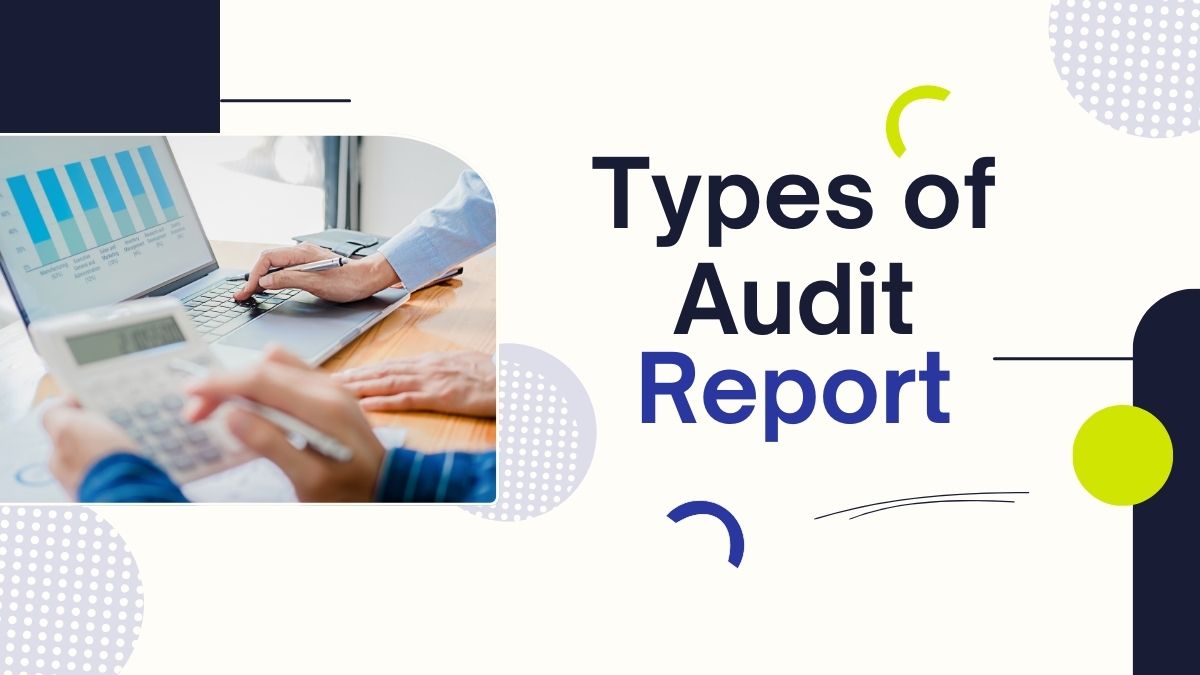Table of Contents
Last updated on October 8th, 2024 at 12:58 pm
Auditing is a crucial function in finance and business as it helps prepare financial statements that are legal, complete, and free of significant errors.
An audit refers to a professional auditor’s external examination of a company’s records to compile a financial statement. The primary purpose is to ensure that the financial statements reflect the company’s financial position and are prepared per the regulations.
For students and aspiring professionals, gaining a thorough understanding of the various types of audit reports is crucial. This knowledge will enhance your ability to navigate the complexities of the financial landscape. This blog will explore the significance of audit reports, their different types, and how to interpret them effectively.
Importance of Audit Reports
Today, audit reports are unavoidable as they contribute to providing business transparency and responsibility. When an external auditor audits a business’s performance, shareholders gain confidence in the company, making it more credible. To businesses, audit reports are vital documents that prove they are running their operations legally and following the set financial reporting standards.
Another crucial facet of audit reports is that they are decision-making instruments. Banks, investors, and other stakeholders use audit reports to evaluate the risks involved in extending credit or investing in a company. An unqualified audit report is preferred because it implies that the business financials are in the correct order, while a qualified or adverse report creates doubt, and people become weary and careful.
What Constitutes an Audit Report?
While understanding the types of audit reports is important, understanding their components is equally crucial for interpreting the auditor’s findings:
- Title and addressee: The report is prepared for and addressed to the shareholders or the company’s governing body.
- Introductory paragraph: This paragraph presents the audited financial statements and the extent of the audit.
- Management’s responsibility: A section indicating that the company’s management is responsible for presenting the financial statements.
- Auditor’s responsibility: This section describes the auditor’s work and duties related to reviewing the financials and adhering to the auditing standards.
- Opinion paragraph: This is the report section where the auditor gives his opinion (e.g., clean or modified).
- The basis for opinion: In this section, if the opinion is modified or negative, the auditor has to express the basis for the modification or the negative opinion they have formed.
Key Types of Audit Reports
Different types of audit reports provide critical insights into the accuracy and reliability of a company’s financial statements.
Below are the four primary types of audit reports:
Unqualified (Clean) Audit Report
An unqualified audit report is a company’s best result from an audit. It can also signify that auditing has not detected any significant incorrect records in the financial statements and that the company has complied with all the appropriate accounting rules. In other words, the financial statements provide an accurate and reliable picture of the company’s economic situation.
Companies with strong internal controls and adherence to standard accounting practices will likely receive an unqualified report, reflecting their commitment to transparency and accuracy.
Qualified Audit Report
When the auditor finds a financial statement problem that leads to a manageable material mistake, they release a qualified audit report. These reports normally summarise the concern, be it the absence of information or slight variation from the accounting regulations.
For example, a company may receive a qualified report if it fails to disclose certain transactions but otherwise follows standard accounting procedures. While the report points to a problem, it does not suggest a broader misrepresentation of the company’s financial health.
Adverse Audit Report
An adverse audit report is a serious warning. It is issued when the auditor believes the financial statements are materially misstated to the extent that they do not accurately reflect the company’s financial position. An adverse opinion raises significant concerns for stakeholders, indicating that the company’s financials are unreliable and may conceal deeper issues.
Companies involved in accounting scandals or facing massive discrepancies in their financial records receive adverse reports, signalling caution for investors and creditors often.
Disclaimer of Opinion
A disclaimer of opinion is issued when the auditor cannot form an opinion on the financial statements, usually due to insufficient evidence. This can occur if the auditor is denied access to necessary records or the company’s internal controls are too weak to support a reliable audit.
If a company’s financial records are incomplete or inaccessible, the auditor may issue a disclaimer indicating that they cannot assess the company’s financial health.
Conclusion
Audit reports are more than formalities—they provide valuable insights into a company’s financial health and operational practices. Understanding the types of internal audit reports helps businesses and stakeholders assess risks, identify red flags, and make informed decisions based on the company’s financial statements.
If you are keen to learn about auditing in finance, accounting, and business management, understanding the different types of audit reports is essential for making informed decisions. An unqualified report suggests stability, while a qualified, adverse, or disclaimed report may signal deeper issues. By learning to interpret these reports, you can more effectively assess the risks and opportunities presented by a company’s financial statements.
Now, from where should you start? financial Accounting courses like PGFAM can help you get started!
Imarticus Learning offers a comprehensive Postgraduate program in Financial Accounting and management . If you’re a commerce graduate with up to 3 years of experience or from an arts background seeking a career shift into finance, the PGFAM course is ideal for you. This program provides practical, hands-on training, equipping you with essential tools and skills to excel in top financial institutions.

